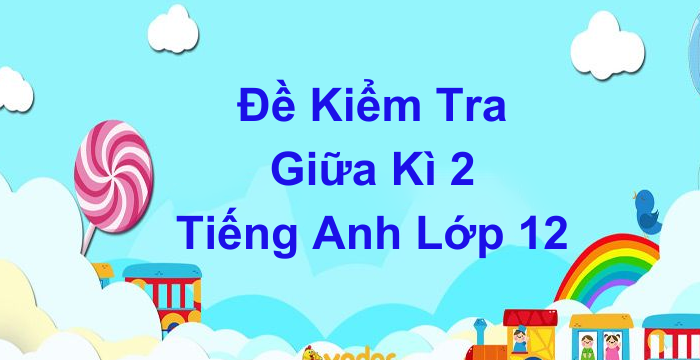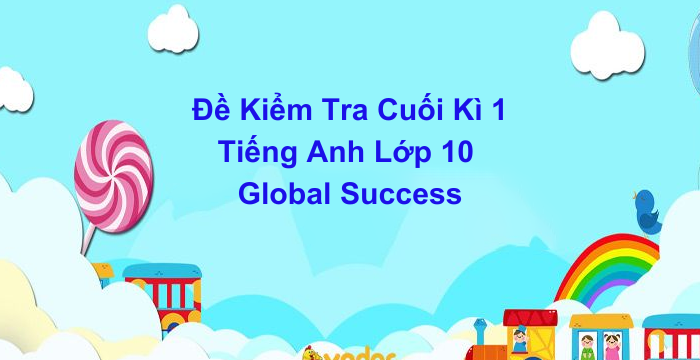Đề Kiểm Tra Giữa Kì 1 Tiếng Anh Lớp 12 Global Success (25.11.2024)
Thầy Thắng
KIỂM TRA GIỮA KÌ LỚP 12
15
Ngày đăng: 25-11-2024 10:51:01

ĐỀ KIỂM TRA GIỮA KÌ I
Thời gian: 45 phút (không kể thời gian giao đề)
Trường THPT Nguyễn Thượng Hiền, TP Đà Nẵng, 2024 - 2025
I. PHẦN TỰ LUẬN
Complete sentences, using words provided or guided
Question 1. A group of scientists are doing research on pollution of rivers in the area (carrying)
………………………………………………………..
Question 2. The factory has released toxic chemicals into the river, and that has a negative impact on the health of residents using these water sources. (which)
………………………………………………………..
Question 3. The telephone rang in the middle of a chatting
→ When ………………………………………………………..
Question 4. My brother / admired / his achievements / physics / chemistry.
………………………………………………………..
II. PHẦN TRẮC NGHIỆM
Choose the letter A, B, C, or D to indicate the word whose underlined part is pronounced differently from the others
Question 1. A. appreciate B. admire C. celebrate D. unfamiliar
Question 2. A. cuisine B. spicy C. souvenir D. mystery
Choose the letter A, B, C, or D to indicate the word that has different stress from the others
Question 3. A. campaign B. duty C. genius D. knowledge
Question 4. A. considerate B. priority C. influential D. experience
Choose the letter A, B, C, or D to indicate the correct answer to each of the following questions.
Question 5 - Nam: I had a wonder time. I took a lot of photos of wild animals.
Mum: I'm so _________ you enjoyed the field trip, Nam.
A. disappointed B. pleased C. worried D. excited
Question 6. We organised a community event to __________ the polluted beaches.
A. get rid of B. go green C. rinse out D. clean up
Question 7.- My brother _______ at the road when he _______ into a hole.
A. wasn't looking - was falling B. didn't look - has fallen
C. wasn't looking-fell D. won't look - fall
Question 8. Since they _______ us they ________ to visit us last Sunday, we _______ forward to the day.
A. were telling - came - looked
B. would tell - would visit - would look
C. told-would come - were looking
D. tell - are coming - will look
Question 9. We are now living in an increasingly _________ world thanks to globalisation.
A. staple B. extracurricular C. delicious D. connected
Question 10. In a new culture, many embarrassing situations occur _______ a misunderstanding.
A. despite B. account of C. because of D. result in
Question 11. Are there any _______ between Vietnamese and American culture?
A. differences B. different C. differently D. differential
Question 12. _________ Gordons is a very interesting family. They like to travel around ________ world.
A. A - the B. The - the C. A - a D. A - Ø
Question 13. Jim: Do you think that people will use less plastic in the future?
Mark: To be honest, ________ that people will reduce platics use soon due to its low cost and convenience.
A. It's likely B. It's unlikely C. It's hard to say D. It's hard to predict
Question 14. The water has become undrinkable because it has been ________ with lead.
A. sorted B. decomposed C. recycled D. contaminated
Question 15. Unless people ________ poaching animals, many species will become extinct.
A. stopped B. stop C. had stopped D. to stop
Question 16. Human beings are responsible _________ the changes in the environment.
A. off B. for C. at D. by
Question 17. A way to save energy is to reduce the amount of ______ used at home.
A. electric B. electrical C. electrically D. electricity
Question 18. Many celebrities adopt a green lifestyle, _______ helps the environment a lot.
A. that B. what C. whose D. which
Choose the letter A, B, C, or D to indicate the word(s) CLOSEST in meaning to the underlined word(s) in each of the following questions.
Question 19. She came up with a great idea for the environment awareness campaign.
A. concealed B. imitated C. recommended D. copied
Choose the letter A, B, C, or D to indicate the word(s) OPPOSITE in meaning to the underlined word(s) in the following question.
Question 20. I'm keen to reduce my carboon footprint but I don't know what to do
A. eager B. unacceptable C. unconcerned D. devoted
Choose the letter A, B, C, or D to indicate the underlined part that needs correction.
Question 21. His family usually goes to a same restaurant to have dinner on Saturday.
Question 22. Environmentalists recommend that we bring a reuse bag when shopping
Read the passage and choose the correct option A, B, C, or D that best fits each of the numbered Marks.
For thousands of years, people have interacted with ecosystems. Many cultures developed around nearby ecosystems. Many Native American tribes of North Americas Great Plains developed a complex lifestyle based (23) _______ the native plants and animals of plains ecosystems, for instance. Bison, a large grazing animal native to the Great Plains, became the most important biotic factor in many Plains Indians cultures, such as the Lakota or Kiowa. Bison are sometimes mistakenly (24) ________ buffalo. These tribes used buffalo hides for shelter and clothing, buffalo meat for food, and buffalo horn for tools. The tallgrass prairic of the Great Plains supported bison herds, (25) _______ tribes followed throughout the year.
As human populations have grown, (26) _________, people have overtaken many ecosystems. The tallgrass prairie of the Great Plains, for instance, became farmland. As the ecosystem shrunk, fewer bison could survive. Today, a few herds survive in (27) _______ ecosystems such as Yellowstone National Park.
(https://education.nationalgeographic.org/resource/ecosystem/#)
Question 23. A. about B. for C. with D. on
Question 24. A. called B. named C. displayed D. showed
Question 25. A. that B. which C. whom D. who
Question 26. A. moreover B. such as C. however D. though
Question 27. A. protecting B. protected C. protection D. protective
Read the following passage and mark the letter A, B, C, or D on your answer sheet to indicate the correct answer to each of the questions
Most people want to be polite and behave well around others. Being polite involves good manners of eating and appropriate ways of greeting and talking to people, and giving and receiving gifts. Polite behaviours may differ from culture to culture.
In the United State, people prefer to shake hands firmly for a few seconds. In some Middle Eastern countries, people hold the person's hand gently for a longer time. What about eye contact? In some countries you show respect when you look at someone directly in the eye. In other parts of the world, looking at someone directly can be rude. Another difference is personal space. In North America, people usually stand about an arm's length apart during a conversation. However, in Latin America, people stand closer
If you are going to live, work, or study in another country, you should learn about its culture. In this way, you can be polite and make a good impression. Politeness can be good for making friends and doing business as well.
(Adapted from Skill for Success by McVeigh and Bixby)
Question 28: What is the passage mainly about?
A. Politeness in different cultures
B. Table manners around the world
C. Giving and receiving gifts
D. Greeting and talking to people
Question 29: According to paragraph 2, in which part of the world do people hold each other's hands gently?
A. In some Middle Eastern countries
B. In the United States
C. In North America
D. In Latin America
Question 30: The word rude in paragraph 2 is closest in meaning to ______
A. unclear B. careful C. impolite D. friendly
Question 31: According to paragraph 2, which of the following is NOT mentioned as an example of differences in politeness around the world?
A. personal space B. hand shaking C. eye contact D. facial expressions
Question 32: The word its in paragraph 3 refers to _____.
A. conversation’s B. country’s C. arm’s D. space’s
—THE END—
Giải đáp mọi thắc mắc trong đề vui lòng liên hệ Zalo: 034 8371 758
Theo dõi fanpage để cập nhật nhanh các bài tập và đề kiểm tra mới nhất.
https://www.facebook.com/profile.php?id=61555984765050
Bài Viết Liên Quan

Đề Kiểm Tra Giữa Kì 1 Tiếng Anh Lớp 12 Global Success (3.12.2025)

Đề Kiểm Tra Giữa Kì 1 Tiếng Anh Lớp 12 Global Success (2.12.2025)

Đề Kiểm Tra Giữa Kì 1 Tiếng Anh Lớp 12 Global Success (28.11.2025)

Đề Kiểm Tra Giữa Kì 1 Tiếng Anh Lớp 12 Global Success (27.11.2025)

Đề Kiểm Tra Giữa Kì 2 Tiếng Anh Lớp 12 Global Success (22.05.2025)

Đề Kiểm Tra Giữa Kì 2 Tiếng Anh Lớp 12 Global Success (20.05.2025)

Đề Kiểm Tra Giữa Kì 2 Tiếng Anh Lớp 12 Global Success (28.03.2025)

Đề Kiểm Tra Giữa Kì 1 Tiếng Anh Lớp 12 Global Success (10.01.2025)

Đề Kiểm Tra Giữa Kì 1 Tiếng Anh Lớp 12 Global Success (10.01.2025)

Đề Kiểm Tra Giữa Kì 1 Tiếng Anh Lớp 12 Global Success (25.11.2024)

Đề Kiểm Tra Giữa Kì 1 Tiếng Anh Lớp 12 Global Success (08.11.2024)

Đề Kiểm Tra Giữa Kì II Tiếng Anh Lớp 12 (26.03.2024)

Đề Kiểm Tra Giữa Kì II Tiếng Anh Lớp 12 (13.03.2024) Đề 2

Đề Kiểm Tra Giữa Kì II Tiếng Anh Lớp 12 (13.03.2024)

Đề Kiểm Tra Giữa Kì II Tiếng Anh Lớp 12 (25.02.2024)

Đề Kiểm Tra Giữa Kì II Tiếng Anh Lớp 12 (25.02.2024)

Bài Đăng Gần Đây

Đề Kiểm Tra Giữa Kì 2 Tiếng Anh Lớp 7 Global Success (3.2.2026)

Đề Kiểm Tra Cuối Kì 1 Tiếng Anh Lớp 10 Global Success (02.01.2026)

Đề Cương Ôn Tập Cuối Học Kì 1 Tiếng Anh Lớp 8 Global Success (30.12.2025)

Đề Kiểm Tra Cuối Kì 1 Tiếng Anh Lớp 6 Global Success (30.12.2025)

